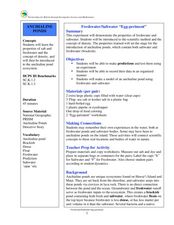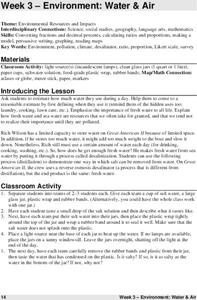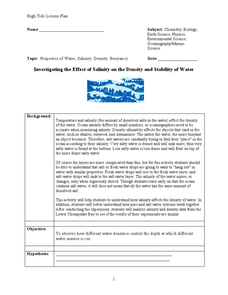Curated OER
Exploring Density with Salt and Fresh Water: Part 5
This particular lesson was written by the National Earth Science Teachers Association, but density is a concept that you can teach at the beginning of the school year in your life, physical, or earth science classes. It would be fun to...
Curated OER
So Much Water, So Little to Drink
Students explore salt and fresh water. In this water lesson plan, students investigate the amount of Earth covered by water. Students compare the amounts of salt water to fresh water. Students create a visual representation to aid...
Curated OER
Freshwater/Saltwater "Eggs-Periment"
Students explore water properties by conducting a class experiment. For this buoyancy lesson, students utilize freshwater, saltwater, plastic cups, hard boiled eggs and food coloring to experiment with the floating capabilities of salt...
Curated OER
Oceans of Fun
Here is a great hands-on activity that should lead to a greater understanding of salt water, why the ocean is salty, and how ocean waves are formed. This terrific, old-school lesson plan has clearly described activities, and all of the...
Curated OER
Salt Water Wedge
Students conduct an experiment to observe the properties of both salt and freshwater. They explain why freshwater will stay at the surface while salt water will travel up a river bottom because of density. Students also research the...
Curated OER
Saltwater Science
Students conduct an experiment that shows them how salt water allows things to float. In this salt water lesson plan, students mix ingredients together to create salt water and observe how it makes the oceans dense. They then interpret...
Curated OER
Environment: Water & Air
The introduction to the lesson mentions a sailor's limited capacity to store drinking water on his ship. Pupils then set up an overnight experiment to remove freshwater from salt water by distillation. There is a math and map activity to...
University of Georgia
Heating and Cooling of Land Forms
Compare heating and cooling rates of different land forms. A lab activity has groups collect data on the rate of heating and cooling of soil, grass, saltwater, fresh water, and sand. An analysis of the rates shows how the different land...
Curated OER
Freshwater Habitats
Young scholars take samples from local freshwater sources and examine them for macroinvertebrate life. They take samples from both shallow and deep freshwater environments, measure temperatures, and classify organisms found in their...
Curated OER
Do Salt Water Fish Drink?
Students conduct an experiment with potato cores and a sucrose solution to investigate how salt water fish process water. They develop a lab report of their experiment.
Curated OER
Living Organisms as Indicators of Pollutants in Fresh Water Ecosystems
Students observe the effects of pollution on living organisms. In this pollution lesson plan, students observe fresh water Hydra and look at their structures and movement. They place samples of pond and lake water on the Hydra and...
Curated OER
Ocean Habitats
Young scholars examine the water samples from a demonstration and discuss the difference between fresh and salt water. They draw different animals that live near or in the ocean and how humans can harm the ocean habitat. They draw...
Curated OER
Investigating the Effect of Salinity on the Density and Stability of Water
Water with varying amounts of dissolved salt are dyed and then used to compare densities. The objective is to discover the effect of salinity, and therefore density, on ocean water on the stability of the ocean. Many branches of science...
Curated OER
Water Issues on Puerto Rico and Oahu: A Comparison of Two Islands
Fifth graders explore how the tow islands receive and use fresh water. They also address some of the threats to the fresh water supply on each island. Students explore the activity objectives through water cycle models and experiments.
Curated OER
The Floating Golf Ball
Learners explore density by floating golf balls. They explore having their golf balls float halfway in a container of water and discuss density and its realtionship to where the golf balls are floating. After adding food coloring, they...
Curated OER
Floating Pencil
Students discover how salt water makes a pencil float better than freshwater by measuring and comparing the lengths of the portion of the pencil that floats above the water surface. They then determine if an unknown water sample is...
Curated OER
Earth Water Distribution and Water Consumption
Learners explore the need for conserving fresh water and understand that it is a limited supply. In this water consumption lesson students participate in an activity and answer questions.
Curated OER
Biocomplexity Lab Activity: Creating Salt Water
The instructional activity seeks to intorduce to students the properties of salt water and how to create salt water. Teacher gives backgound information about salt water to students. From that point, students dscuss what elements are...
American Chemical Society
Changing the Density of a Liquid - Adding Salt
Fourth in a set of several little lessons on density, this one compares the density of fresh and salt water. First by demonstration, and then by a hands-on activity, learners find that adding salt increases the density, as is evidenced...
Curated OER
MEASURING THE DENSITY OF WATER
Students perform an experiment to measure the density of tap water vs. salt water.
Curated OER
Sea Water Freeze
Students observe how salinity affects the time it takes water to freeze. They participate in an experiment to determine that ice is essentially salt-free whether formed from fresh or salt water
Georgian Court University
Introduction to Marsh Ecology
Compare and contrast the characteristics of fresh and salt water marshes. After exploring the typical plants and animals found in each marsh type, participants use a set of flash cards to sort into fresh and salt water marsh life. Their...
Curated OER
Summer Intern
Your young apprentices build a function describing the percent concentration of salt in a brine. The rational function is then related to the parent function, y= 1/x, and graphed. Finally, the apprentices predict the amount of fresh...
Curated OER
Science Lesson #2
Fourth graders explore and experiment with objects that float to see if they float differently in salt water or fresh water. After the experiment, they write a paragraph in their science journal explaining how fresh water and ocean water...

























